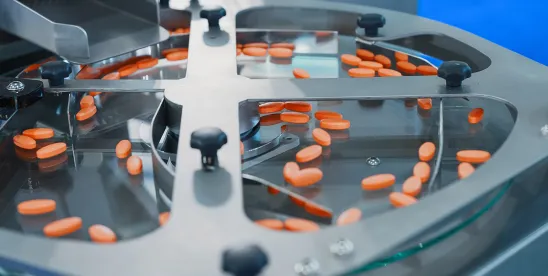On November 12, 2024, the drug manufacturer Johnson & Johnson (J&J) filed a lawsuit against the Health Resources and Services Administration (HRSA) in the United States District Court for the District of Columbia. The lawsuit relates to J&J’s proposal to require certain 340B covered entities – specifically, disproportionate share hospitals (DSH) – that purchase J&J’s drugs Stelara and Xarelto under the 340B Drug Pricing Program (340B Program) to do so under a rebate model. J&J is challenging HRSA’s threatened enforcement action against the drug maker.
The 340B Program
The 340B Program requires that drug manufacturers “offer” covered outpatient drugs to 340B “covered entities” for “purchase” at or below the 340B ceiling price which is calculated in accordance with the statute governing the 340B Program. Along with DSHs, which are non-profit or publicly-owned hospitals that serve a significantly disproportionate number of low-income Medicare patients, “covered entities” include Federally Qualified Health Centers (FQHCs), Critical Access Hospitals, Native Hawaiian Health Centers, Tribal and Urban Indian Organizations, children’s hospitals, and providers that care for rural populations. The 340B statute only allows covered entities (or their contract pharmacies) to dispense drugs acquired through the 340B Program (340B Drugs) to eligible patients (i.e., patients of the covered entities). The statute also explicitly prohibits the transfer of covered drugs to ineligible patients, known as diversion, and is designed to avoid “duplicate” discounts (drugs that are subject to a Medicaid Rebate and 340B pricing). J&J alleges in this suit that business changes, such as the increase in the use of contract pharmacies, and 340B Program changes have led to a substantial amount of diversion in violation of the statute.
In the suit, J&J describes a business change by covered entities over the years since the inception of the 340B Program in 1992 that, in its view, has contributed to diversion. Historically, covered entities maintained a separate physical inventory for 340B Drugs, and their pharmacies were required to, at the point-of-sale, ensure that 340B Drugs were only dispensed to eligible patients. In recent years, many covered entities have moved to an administratively simpler virtual “replenishment” model that does not require physically segregating 340B Drugs from the general stock. Instead, the covered entity tracks 340B Drugs that have been dispensed, and the covered entity replaces, or replenishes, its stock of 340B Drugs by purchasing additional 340B Drugs from the manufacturer or a wholesaler when necessary.
J&J’s 340B Rebate Proposal
On August 23, 2024, J&J informed DSH covered entities which purchased its drugs that, beginning October 15, 2024, it would begin utilizing a 340B rebate model to effectuate the 340B ceiling price for such entities. The model, as outlined by J&J, only applies to DSH covered entities that purchase J&J's drugs Stelara and Xarelto. According to the proposed model, the DSH entities would purchase the drugs at the non-340B drug price and would submit a claim to J&J’s vendor, Beacon Channel Management, once the drug was dispensed to a 340B eligible patient. Once the claim was validated by J&J, the DSH would then receive a rebate, discounting the purchased drug to the 340B ceiling price, within 7 to 10 days of validation. In a letter discussing the proposed rebate model, J&J explained that it believed that the rebate model would allow the manufacturer to “carry out its 340B obligations while protecting program integrity, consistent with the 340B statute’s prohibitions again duplicate discounts and diversion [and] allow J&J to efficiently identify and eliminate duplicate discount requests from other government and commercial programs.”
The announcement of the rebate model was met with swift criticism from covered entity stakeholders. The American Hospital Association (AHA) said that the proposal was illegal and would harm patients and 340B providers, shift the responsibility for determining rebates from the government to J&J, and force hospitals to develop expensive administrative systems to track rebate requests. Likewise, a bipartisan group of 188 members of the House of Representatives sent a letter to HHS that called the proposal an “unapproved and unlawful change would have severe consequences for our nation’s safety net providers and the patients they serve” and urging it to “use every enforcement tool at [HHS’] disposal to protect” the DSH covered entities.
On September 17, 2024, HRSA rejected J&J’s proposal, reasoning that the “rebate proposal violates J&J’s obligations under the 340B statute, and HRSA expects J&J to cease implementation of it.” In response to a September 19 response letter from J&J, HRSA sent another letter to J&J on September 27 informing the drugmaker that it believed the rebate proposal to be unlawful and if J&J did not cease the program’s implementation, the agency would move forward with terminating the manufacturer’s Pharmaceutical Pricing Agreement (PPA) that would in turn remove the manufacturer from the 340B Program and terminate coverage of J&J’s products under Medicaid and Medicare Part B. On September 30, J&J announced that it would forgo plans to implement its proposed rebate model. In its announcement, J&J also criticized HRSA’s threatened actions as both detrimental to patient care and to 340B Program integrity.
J&J’s Lawsuit
In its lawsuit, J&J argues that HRSA’s threatened enforcement action and refusal to allow the manufacturer to institute a rebate model was arbitrary and capricious, an abuse of discretion, and/or not in accordance with federal law in violation of the Administrative Procedure Act (APA). The central argument in J&J’s complaint is that the 340B statute contemplates and even permits the use of a rebate model to effectuate the 340B ceiling price, noting that the statute expressly instructs the Department of Health and Human Services (HHS) Secretary to enter into PPAs with manufacturers for covered outpatient drugs under which “the amount required to be paid (taking into account any rebate or discount, as provided by the Secretary) to the manufacturer for covered outpatient drugs . . . does not exceed” the “ceiling price.” In support of its argument, J&J also points to legislative and regulatory history to suggest that the 340B ceiling price could be effectuated via “rebates” and “discounts.”
J&J’s argument also focuses on the role of the PPA entered into by manufacturers and HRSA, arguing that the PPA itself does not specify the type of pricing mechanism to be used to effectuate the 340B ceiling price and thus neither expressly provides for the use of the replenishment model nor prohibits the use of a rebate model. In the suit, J&J suggests that a rebate model would help ameliorate its concerns over duplicate discounts and diversion and allow the manufacturer to comply with other federal drug pricing program requirements.
While the government has not yet responded in court, the AHA responded immediately to the J&J filing with a statement that “J&J’s legal arguments are completely meritless.”
While some of the correspondence between HRSA and J&J was publicly available prior to J&J filing the lawsuit, the complaint sheds further light on the discussions between HRSA and J&J prior to the announcement of the rebate proposal. J&J indicates that it expressed its concerns directly to HRSA in April and June 2024 and requested that HRSA permit the manufacturer to conduct audits of certain covered entities. While HRSA authorized J&J to audit eleven covered entities, J&J claims that eight of the covered entities have refused to comply with the audit, and six of the covered entities (five at the time of the complaint) have since filed lawsuits against HRSA related to its approval of the audits. According to J&J, the response to its audit is what prompted its decision to move forward with a rebate model.
The lawsuit explains that after J&J formally notified HRSA of its intent to use the rebate model on July 24, 2024, the agency made clear to the manufacturer that, in its view, J&J lacked the authority to institute a rebate program without approval from HRSA. Ultimately, the events culminated with J&J announcing its rebate model in August, provoking the agency to issue its letter dated September 17, 2024 informing J&J that the rebate program would violation J&J’s obligations under the 340B statute.
Analysis
The lawsuit comes at a pivotal time for the 340B Program and for HRSA itself in the wake of Genesis Healthcare v. Becerra, where the United States District Court for the District of South Carolina ruled against HRSA’s restrictive interpretation of “patient” under the 340B statute. Also, the court in this suit may take into consideration the impact of Loper Bright Enterprises v. Raimondo, overruling Chevron deference to HRSA’s interpretation of the 340B statute. Additionally, the upcoming change in administration will almost certainly result in a new HRSA administrator, which may impact the response to the lawsuit. In a October 2021 lawsuit brought by Kalderos, a drug industry vendor that had developed platforms to facilitate, among other things, the payment of 340B discounts in the form of rebates over HRSA’s prohibition on 340B rebates, HRSA requested a stay of the proceedings rather than filing an answer to Kalderos’ initial complaint. HRSA had requested that the case be stayed pending the D.C. Circuit’s ruling in Novartis Pharmaceuticals Corporation v. Johnson and United Therapeutics v. Johnson, which had similar legal questions to the Kalderos lawsuit. On May 21, 2024, a three judge panel for the D.C. Circuit resolved both cases, finding unanimously that the 340B statute “does not categorically prohibit manufacturers from imposing conditions on the distribution of covered drugs to covered entities.”
The next Congress could consider legislation to address the manufacturers’ concerns or respond to covered entities’ advocacy to make sure the intended discounts are not impeded or restricted. As indicated by the letter sent by 188 House members in this Congress, there is bipartisan support now for HRSA’s opposition to the rebate model. Notably, Senator John Thune, who will replace Mitch McConnell as the Senate majority leader during the next legislative term, has been described as a “champion” of the 340B Program and covered entities. Earlier this year, Senator Thune led a bipartisan working group seeking stakeholder comments on how to address concerns that have been raised about the Program, including HRSA’s authorities and resources; contract pharmacy arrangements; the role of PBMs in the program; duplicate discounts; and the promotion of transparency and program integrity.
Final Thoughts
While there are various pending state and federal lawsuits involving the 340B Program, a decision in this case will have a widespread impact on the broader administration of the 340B Program. Stakeholders and members of Congress will likely monitor the litigation closely. Since J&J’s filing of its complaint, Kalderos has filed an amended complaint seeking to revive its lawsuit against HRSA. On November 14, Eli Lilly filed a similar lawsuit against HRSA related to HRSA’s denial of the drugmaker’s request to allow a 340B rebate model for all its 340B-eligible drugs. It remains to be seen what actions, if any, will be taken in the interim to address growing 340B Program controversy, or if HRSA and Congress will effectively allow the courts to chart the 340B Program’s future.






 />i
/>i

